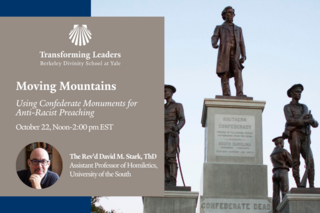Online
Moving Mountains: Using Confederate Monuments for Anti-Racist Preaching

This event has passed.
Confederate monuments preach. Among other things, they make troubled claims about God, community, virtue, and hope. Today, these monuments preach by localizing and signifying harmful theologies in churches and communities. Thus, dislodging these monuments requires more than physical removal or recontextualization. It demands counter-proclamation. This workshop offers resources for counter-proclamation by confronting Confederate monuments as troubling preachers in the community. Drawing on insights from historical study, Womanist theology, and postcolonial homiletics, this workshop explores how leaders might engage troubling monuments in their anti-racist work. Designed for clergy and community leaders, this workshop invites participants to:
- Develop skills for critical and theological examination of monuments.
- Gain strategies for localized, anti-racist preaching by studying preaching exemplars who confront Confederate monuments in their community.
- Reflect creatively and courageously on using monuments for anti-racist preaching in their community. Participants are encouraged to bring a photo and a short description of a monument from their context.
About the instructor:
The Rev’d Dr. David M. Stark, Th.D. is Assistant Professor of Homiletics and Co-Director of the Truth, Racial Healing, and Transformation Center at the University of the South. He is a member of the university’s Names and Places Committee. Dr. Stark is also the editor of the International Journal of Homiletics (ijhomiletics.org). He is the author of Singing and Suffering with the Servant: Second Isaiah as Guide for Preaching the Old Testament (Vandenhoeck & Ruprecht 2022). His newest book, Preaching That Confronts Confederate Monuments: Religion and Anti-Racism in US Politics, will be published by T&T Clark in 2025. Dr. Stark is an ordained Elder in the United Methodist Church and has served rural and urban congregations in North Carolina.